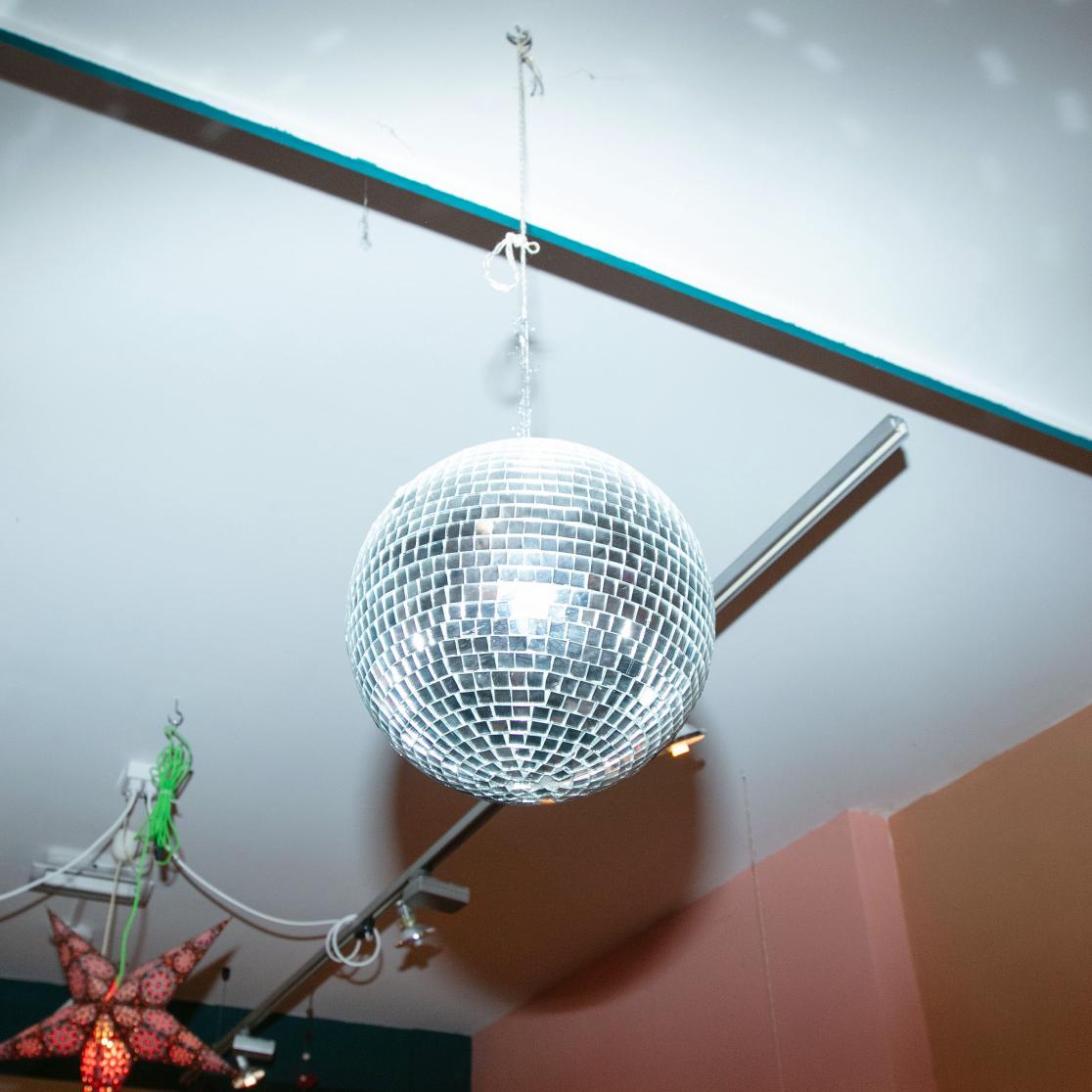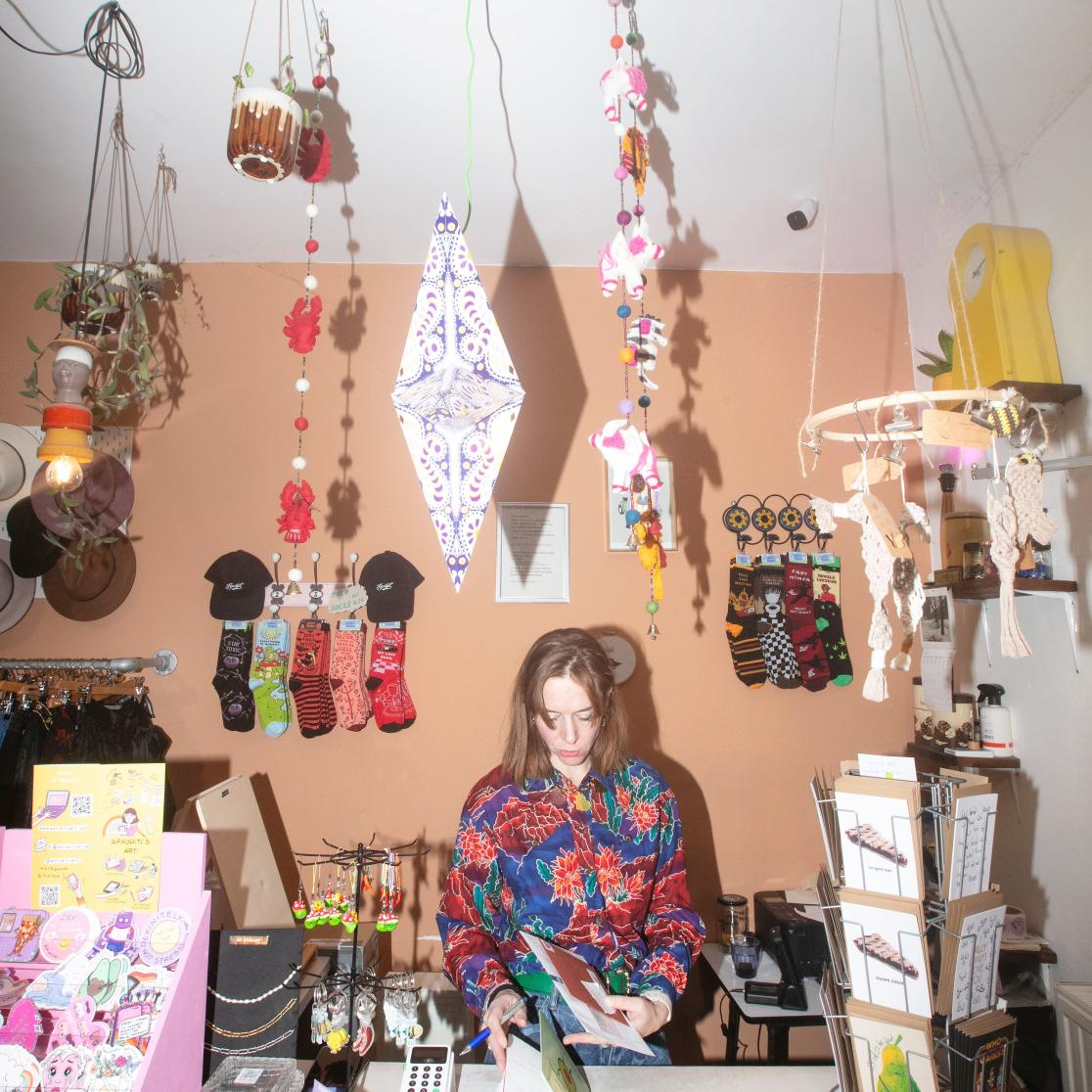The wonderful (Limburgish) world of Westermann
Owned and run by UM alum Natalia Westermann, the Dotnsquare store on the Heggenstraat in Maastricht is a vibrant tribute to polka dots, pragmatism, sustainability, social entrepreneurship and love for Limburg.
A sparkling disco ball hangs from the ceiling. Retro pop music plays softly through the speakers. The shop is a treasure trove of vintage clothing and eye-catching gifts—coffee mugs decorated with vulvas, pizza-themed polka-dot socks and heart-shaped earrings. Behind the counter stands Natalia Westermann, dressed in wide-legged trousers and a colourful band shirt. “I totally understand if people feel overwhelmed here,” she laughs. “But this is just my style. Dotnsquare reflects my chaotic brain.”
A delivery person knocks on the window. “We also serve as a parcel pick-up point,” she explains. “It’s run by young people from Limburg who face disadvantages on the regular labour market; part of a collaboration with Athos, a social organisation.” Westermann made a conscious choice not to set up an online store; Dotnsquare is a physical shop only. “Vintage clothes vary in terms of size and fit, so it’s easier if people can try them on. But more importantly, I enjoy the personal contact with customers. There’s a reason our motto is promoting social and local.”
Entrepreneurial pursuits
Westermann was raised in a socially progressive family in Groningen. “Wearing second-hand clothes was normal for us.” She was an active child who became a vegetarian at a young age. Her interest in health, nutrition and sustainability eventually led her all the way to Maastricht for the master’s degrees in Healthcare Policy, Innovation & Management. She soon felt at home here, not least due to the good study guidance—even if she occasionally prioritised her entrepreneurial pursuits over her studies. “I joined Enactus, a student organisation focused on sustainability, and worked with a team to produce items like notebooks with recycled paper. And before that I’d started organising clothing swaps.”
Jeans
It was a batch of vintage jeans that led her to turn her hobby into a career. “I bought them from a wholesaler and managed to earn a profit from selling them. That gave me all kinds of new ideas.” She sold clothes through a Facebook group that grew to thousands of members, ran a personal shopping service from her tiny living room, and established various shop-in-shops and pop-ups around Maastricht. In 2021, undeterred by the pandemic, she fulfilled her dream of opening her own shop. “I couldn’t see myself working in a lab or an office. I’m a doer; I thrive on learning through experience. So entrepreneurship is a good fit for me.”
Consumer society
With her pragmatic attitude, Westermann doesn’t consider herself a typical academic. But she is grateful for everything she learnt, and thinks fondly of the university. Many of the gifts she sells in her shop are produced by local female creators, mostly current students and fellow alumni. “UM taught me a lot about working together, connecting people and motivating them to take steps towards sustainability. We encourage people to combat climate change in their own way, such as buying less new stuff.”

She acknowledges that her shop is part of a consumer society. “But second-hand clothing is more eco-friendly than clothes that are newly produced,” she points out. “My mission is to encourage as many people as possible to buy second-hand. I select all the clothing in the shop myself, so I can make sure it’s high quality and durable. And almost everything is vintage, which means at least 20 to 30 years old. That’s what sets Dotnsquare apart from many thrift shops and second-hand shops.”
Maastricht locals
The n in Dotnsquare stands for her first name, Natalia, whereas dot and square refer to different clothing shapes and patterns. “I’ve always felt drawn to dramatic outfits that stand out. I’m currently looking for a plain black dress, but I’ll probably wear it with a bright pink pinafore. There’s room for a more outspoken style in Maastricht; people here dress stylishly and elegantly, but they don’t like to stand out too much.”
Does she have any advice for Maastricht locals (and non-locals, for that matter) looking to try vintage shopping for the first time? “Don’t come with a specific item in mind. Let us surprise you,” she says. “If you’re looking for, say, a beige coat with three-quarter sleeves, you probably won’t find it here. Ask the staff for help—they know exactly what’s in store and what might suit you.”

“UM taught me a lot about working together, connecting people and motivating them to take steps towards sustainability.’’ - Natalia Westermann
Children's parties
“Ask for help” is also her advice to fellow alumni aspiring to start their own business. “Expand your network by joining an entrepreneurial network like YES. Talk to business owners in different sectors and listen to their experiences. You don’t have to reinvent the wheel. And most importantly, don’t overthink it—just do it!”
Thanks to her studies, her entrepreneurial network and her shop, Westermann has built up a sizeable social network in Maastricht. Even though she is from Groningen, she sees her future here, because she is having a good time here. “I used to plan no more than a month ahead, but now I enjoy thinking long term. Dotnsquare is here to stay, but I might diversify at some point. I’m thinking of organising children’s parties, with fashion shows and costume parties using second-hand clothing. You’re never too young to learn, right?”
Text: Milou Schreuders
Maastricht University is proud to be the most international university in the Netherlands. We are grateful for the richness and diversity provided by our international staff, students and study programmes—and the ensuing endless supply of inspiring stories. This is one of those stories.
#FromTheRegionForTheRegion.
Do you want to read, watch and listen to more stories? Visit our campaign page.
Also read
-
A new wave of talent emerges from the School of Business and Economics
On Sunday, November 30, 2025, the Maastricht University School of Business and Economics (SBE) proudly celebrated the achievements of over 1,461 graduates from both bachelor’s and master’s programs. The festive ceremony took place at the MECC Maastricht and marked a significant milestone for the SBE
-
Roy Broersma (CEI): Guiding Aestuarium from idea to venture
Roy Broersma, director of the Center for Entrepreneurship & Innovation (CEI) at SBE, has been closely involved in guiding Aestuarium from an early student startup to a growing venture. From spotting their potential during the Brightlands Startup Challenge supporting them through CEI.
-
From Study to Startup: The story behind Famories
When Lennie and Neele graduated, while many of their classmates were busy fine-tuning CVs and stepping into roles at top companies, they took a detour by recording podcasts with their grandmas. What began as a charming way to cherish family memories has blossomed into Famories, a vibrant startup with a...